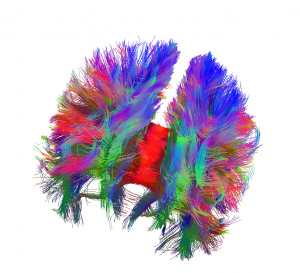Special congratulations to the Spatial Neuroscience Lab’s own, Alina Tu, for winning the Christian Freksa award for Best Presentation at Spatial Cognition!
Way to go!
Alina wins Christian Freksa award at Spatial Cognition!
Extending a warm welcome to our new Post Doctoral Scholar, Mike Starrett!
The Spatial Neuroscience Lab would like to welcome our new Post Doctoral Scholar, Mike Starrett, Ph.D., to the lab! Mike joins us from the University of Arizona, and his research focuses on the cognitive and neural mechanisms that underly flexible human spatial cognition and navigation, as well as broad interests in human memory and attention across the lifespan.
Happy to have you join us, Mike!
Lily receives Roger W. Russell Award in the Neurobiology of Learning and Memory
Huge congratulations to the Spatial Neuroscience Lab’s own, Lily Cheng, for receiving the Roger W. Russell Award in the Neurobiology of Learning and Memory!
The award is given in memory of Dr. Roger W. Russell to recognize an individual who demonstrates dedication to exacting scholarship, integrity, collegiality, and steadfast support of the goals and programs of the CNLM. Lily will be honored at the upcoming virtual CNLM Awards Ceremony on May 18th, 2021.
Congratulations again, we are so proud of you!
Check out our YouTube channel!
Head to the Lab Resources tab on our webpage to view the link to our Spatial Neuroscience YouTube channel! (also linked below)
https://www.youtube.com/channel/UC5PJE8zgo0osotptr_a4bBQ/featured
Chrastil Lab publishes paper on age-related changes in spatial navigation
Chrastil Lab publishes paper, “Age-related changes in spatial navigation are evident by midlife and differ by sex” in Psychological Science (2021).
Authors : Yu, S., Boone, A. P., He, C., Davis, R., Hegarty, M., Chrastil, E.R., & Jacobs, E.
*See link under publications tab!
Chrastil Lab publishes new paper on perspective taking in Psychonomic Bulletin and Review
Chrastil Lab publishes paper in Psychonomic Bulletin and Review (2021), “Directionality eclipses agency: How both directional and social cues improve spatial perspective taking”
Authors: Gunalp, P., Chrastil, E.R., & Hegarty, M.
*See link under publications tab!
Chrastil Lab publishes a paper in Journal of Experimental Psychology: Human Perception and Performance
Chrastil Lab publishes a paper, “Executing the homebound path is a major source of error in homing by path integration”, in Journal of Experimental Psychology: Human Perception and Performance. (2021)
Authors of the paper : Elizabeth R. Chrastil and William H. Warren.
(See link under publications tab)
Liz and Lily Present at Psychonomic Society
Liz and Lily presented at the 61st annual Psychonomic Society meeting, which happened virtually on November 19-22, 2020. Lily and Liz both authored the poster discussing The Emergence of Head Direction Signals in Human Navigation.
Liz also gave a talk at the meeting, discussing her work on Individual Differences in Wayfinding Strategies in Real and Virtual Environments. The full list of authors on this talk were, Mary Hegarty (University of California, Santa Barbara), Chuanxiuyue He (UCSB), Alexander P. Boone (Oregon State University), and Elizabeth R. Chrastil (University of California, Irvine).
Lily speaks at Neuromatch Conference 3.0

Lily presented her research, Travel Direction as a Fundamental Component of Human Navigation, at Neuromatch Conference 3.0 on October 30th, 2020.
A video recording of her presentation can be found on youtube here: https://www.youtube.com/watch?v=rMSzHMW_kgQ
(1:41-1:55)
Lily and Shuying Present at iNav!
Ph.D. candidate and graduate student in the Spatial Neuroscience Lab at UCI, Lily Cheng, presented her work, Travel Direction as a Fundamental Component of Human Navigation, at the 3rd virtual Interdisciplinary Navigation Symposium (iNAV 2020) this past October 5th-7th.
The research investigated the role of travel direction in the internal representation system of human navigation using a visual motion adaptation paradigm in virtual reality.
Great job Lily!
Additionally, Ph.D. student at our associate lab, UCSB Jacob’s Lab , Shuying Yu, presented her work, Sex Differences and Age-Related Changes in Spatial Navigation also at iNAV 2020.
The research investigated healthy young and midlife men and women on three different aspects of spatial navigation (path integration, acquisition of spatial knowledge, and navigational strategy) in order to investigate whether navigational deficits emerge earlier in the aging process or whether these age-related changes vary by sex. Results revealed three major findings: 1) path integration ability is preserved through midlife and does not differ by sex; 2) robust sex differences in spatial knowledge acquisition are observed in young adulthood, which persist but are diminished with age; and 3) by midlife men and women show decreased ability to acquire spatial knowledge and an increased reliance on taking habitual paths. Together, the findings indicated that age-related changes in navigation ability and strategy are evident by midlife.
Great job Shuying!

